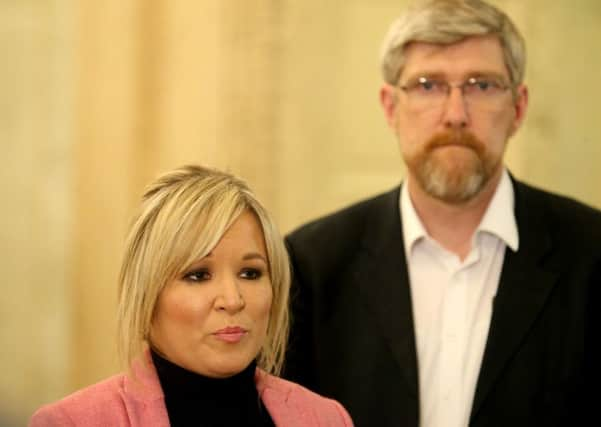Sam McBride: Sinn Féin leadership contest is deeply unorthodox


Sinn Féin MLA John O’Dowd is doing something which until now was close to unthinkable – openly attempting to oust the party’s northern leader, Michelle O’Neill.
The challenge is all the more audacious because Ms O’Neill was given the role with the endorsement of the late Martin McGuinness and Gerry Adams – the architects of modern Sinn Féin.
Advertisement
Hide AdAdvertisement
Hide AdAlthough Mr McGuinness’s successor was always going to find it difficult to step into his authoritative position, Ms O’Neill’s approach has not been to everyone’s taste.
Unerringly on-message, the former agriculture and health minister often sounds like a walking press release, delivering agreed lines regardless of the question.
But while that is a matter of opinion, it is a matter of fact that the party is losing votes in Northern Ireland on her watch. In May, Sinn Féin’s share of the vote fell by almost a percentage point in the council election and by more than three percentage points in the European election.
Ms O’Neill cannot be blamed for that in its entirety. Mary Lou McDonald is the party leader and Sinn Féin’s vote fell sharply in the Republic, costing it MEPs. It remains well down in the polls in the south.
Advertisement
Hide AdAdvertisement
Hide AdIn August, it emerged that Mr O’Dowd was challenging for the position as the party’s vice president.
That news did not emerge in the conventional way, with a statement or a press conference. Rather, the experienced Upper Bann MLA’s move emerged in the Belfast Telegraph – a newspaper not known for its wide republican readership – after apparently being leaked from within Sinn Féin.
When the newspaper asked about his challenge, he said: “I can confirm that I am going forward (for the position)...I would prefer to talk to more party members first but I will release a more detailed statement at a later date.” More than two months later, Mr O’Dowd has still not released that statement.
Initially, Ms O’Neill responded by welcoming the challenge. She said: “Sinn Féin is a democratic party and I welcome democratic debate and choice within the party.”
Advertisement
Hide AdAdvertisement
Hide AdBut Sinn Féin’s most senior northern figure has not been campaigning. It is almost as if the result is a foregone conclusion and arguments which might appeal to wavering party members are unnecessary.
While Ms O’Neill, who has been endorsed by a host of the party hierarchy, claimed that she welcomed being challenged, others have bluntly admitted that they do not like an openly democratic contest.
Mr O’Dowd appears to have been frozen out by the party hierarchy and veteran MP, Francie Molloy made clear that he was “disappointed” at the contest, appearing nostalgic for an era where such issues were sorted behind closed doors.
Yesterday a News Letter request to speak to Mr O’Dowd went unanswered. Chris Donnelly, a former Sinn Féin candidate who is one of the shrewdest observers of nationalism, said that it was very unlikely that Mr O’Dowd would win.
Advertisement
Hide AdAdvertisement
Hide AdHowever, he added: “I would not be surprised if he picks up significant support because what I was hearing from across the north...is that there have been people moving in his direction”.
The republican commentator said that although the party will “close ranks” and attempt to focus on the general election, “that doesn’t mean that this is closed – John O’Dowd has now positioned himself as the person who people internally will look towards if the party is seen to lose direction over the next 12 months or beyond that.”
Given how low key Mr O’Dowd’s campaign has been, it is almost like that of a stalking horse – albeit a thoroughbred. In those circumstances, it would indicate significant internal discontent if a large number of votes went to someone who hasn’t even campaigned.